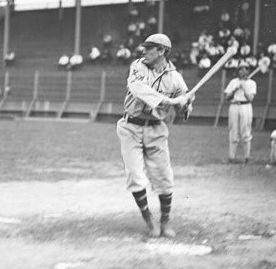Branch Rickey
Appearance

Wesley Branch Rickey (December 15, 1881 – December 9, 1965) was actively involved in Major League Baseball for 50 years. During his career in baseball, he developed the farm system. However, his most significant accomplishment was helping to integrate organized baseball in 1946, when Jackie Robinson played his first and only season with the minor league Montreal Royals. Robinson would integrate Major League Baseball on April 15, 1947, as a member of the Brooklyn Dodgers.
Quotes
[edit]- ....Humankind, -- that all men anthropological come from the same source, with the same potentials, must have a potential equality in chance and opportunity and that is so right, I think, that posterity will look back upon what we are doing today in our domestic issues here. They will look back upon it, I think, with incredulity and they'll wonder what the issue was all about. I really think so. It's solved in baseball. It'll be solved educationally. It'll be solved everywhere in the course of time. [1]
- My eight years in Brooklyn gave me a new vision of America, or rather America gave me a new vision of a part of itself, Brooklyn. They were wonderful years. A community of over three million people, proud, hurt, jealous, seeking geographical, social, emotional status as a city apart and alone and sufficient. One could not live for eight years in Brooklyn and not catch its spirit of devotion to its baseball club, such as no other city in America equaled. Call it loyalty, and so it was. It would be a crime against a community of three million people to move the Dodgers. Not that the move was unlawful, since people have the right to do as they please with their property. But a baseball club in any city in America is a quasi-public institution, and in Brooklyn the Dodgers were public without the quasi.
- On the relocation of the Dodgers from Brooklyn to Los Angeles; quoted in Bob McGee, The Greatest Ballpark Ever: Ebbets Field and the Story of the Brooklyn Dodgers (Rutgers University Press, 2005, ISBN 0813536006), p. 294 [1]
- Baseball people are generally allergic to new ideas; it took years to persuade them to put numbers on uniforms, and it is the hardest thing in the world to get Major League Baseball to change anything—even spikes on a new pair of shoes—but they will eventually...they are bound to.
- In 1954. [2]
- "Luck is the residue of design."
- The Yale Book of Quotations attributes this to the "Sporting News", Feb. 21, 1946.
About Branch Rickey
[edit]- Alphabetized by author
- Branch Rickey made me a better man.
- Bobby Bragan, explaining why he had come to Rickey's funeral. Bragan, who was a catcher for the Brooklyn Dodgers in 1947, had initially tried to stop Rickey from integrating the team. [3]
- Folks, this here young man deserves to be in the Hall of Fame. Not only because he pitched two no-hitters, but because he got two bonuses from Branch Rickey.
- Dizzy Dean, speaking on May 12, 1956 about pitcher Carl Erskine, during a post-game radio interview following Erskine's second career no-hitter; as quoted by Erskine in Tales from the Dodgers' Dugout: A Collection of the Greatest Dodgers Stories Ever Told (2004), p. 70
- Mr. Rickey almost signed me for the Pittsburgh Pirates, but I decided I didn't want to be a bonus baby.
- Don Drysdale, as quoted in "Here's the Pitch" by Frank Finch, in The Los Angeles Times (June 5, 1958), p. C2
- Rickey had all the money and all the players and never let the two get together.
- Ralph Kiner, speaking on April 15, 2004, Jackie Robinson Day, in the FSNY broadcast booth; as quoted in "Dog Gone? No Way; Russo Listens to Heart, Stays with FAN" by Bob Raissman, in New York Daily News (April 18, 2004), p. 85
- In 1939 I led the league in hitting with .349. Naturally after a year like that you look forward to talking contract. But when I sat down with Rickey, he said, "Well, your home run production stayed pretty much the same." No mention of my batting average. So the next year I hit 43 home runs, which is still the Cardinal club record, and led the league in runs batted in. But my average went down. When I went in to talk contract this time, he said, "Well, your batting average wasn't so good. Would you be willing to take a cut?" I led the league in runs batted in, and he wanted to know if I'd take a cut!
- Johnny Mize, as quoted in Baseball When the Grass Was Real: Baseball from the Twenties to the Forties Told by the Men Who Played It (1975) by Donald Honig, p. 104
- I'll tell you what the word used to be about Rickey. Stay in the pennant race until the last week of the season, and then get beat. I heard some talk to the effect that that was what he preferred. That way he drew crowds all year, and then later on the players couldn't come in for the big raise for winning the pennant and maybe the World Series. I don't know if it's true or not, but that was the talk.
- Johnny Mize, as quoted in Baseball When the Grass Was Real (1975) by Donald Honig, pp. 105-106
References
[edit]External links
[edit]| This article about a sportsperson is a stub. You can help out with Wikiquote by expanding it! |
